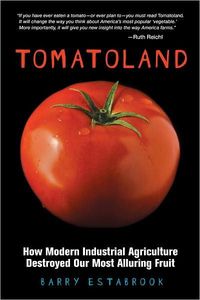

Purchase
How Modern Industrial Agriculture Destroyed Our Most Alluring Fruit
Andrews McMeel Publishing
June 2011
On Sale: June 7, 2011
240 pages
ISBN: 1449401090
EAN: 9781449401092
Hardcover
Add to Wish List
Non-Fiction Gardening
Supermarket produce sections bulging with a year-round
supply of perfectly round, bright red-orange tomatoes have
become all but a national birthright. But in Tomatoland,
which is based on his James Beard Award-winning article,
"The Price of Tomatoes," investigative food journalist Barry
Estabrook reveals the huge human and environmental cost of
the $5 billion fresh tomato industry. Fields are sprayed
with more than one hundred different herbicides and
pesticides. Tomatoes are picked hard and green and
artificially gassed until their skins acquire a marketable
hue. Modern plant breeding has tripled yields, but has also
produced fruits with dramatically reduced amounts of
calcium, vitamin A, and vitamin C, and tomatoes that have
fourteen times more sodium than the tomatoes our parents
enjoyed. The relentless drive for low costs has fostered a
thriving modern-day slave trade in the United States. How
have we come to this point? Estabrook traces the supermarket tomato from its birthplace
in the deserts of Peru to the impoverished town of
Immokalee, Florida, a.k.a. the tomato capital of the United
States. He visits the laboratories of seedsmen trying to
develop varieties that can withstand the rigors of
agribusiness and still taste like a garden tomato, and then
moves on to commercial growers who operate on tens of
thousands of acres, and eventually to a hillside field in
Pennsylvania, where he meets an obsessed farmer who produces
delectable tomatoes for the nation's top restaurants. Throughout Tomatoland, Estabrook presents a who's who cast
of characters in the tomato industry: the avuncular
octogenarian whose conglomerate grows one out of every eight
tomatoes eaten in the United States; the ex-Marine who heads
the group that dictates the size, color, and shape of every
tomato shipped out of Florida; the U.S. attorney who has
doggedly prosecuted human traffickers for the past decade;
and the Guatemalan peasant who came north to earn money for
his parents' medical bills and found himself enslaved for
two years. Tomatoland reads like a suspenseful whodunit as well as an
expose of today's agribusiness systems and the price we pay
as a society when we take taste and thought out of our food
purchases.
Comments
No comments posted.
Registered users may leave comments.
Log in or register now!
| 


 © 2003-2024 off-the-edge.net
all rights reserved Privacy Policy
© 2003-2024 off-the-edge.net
all rights reserved Privacy Policy